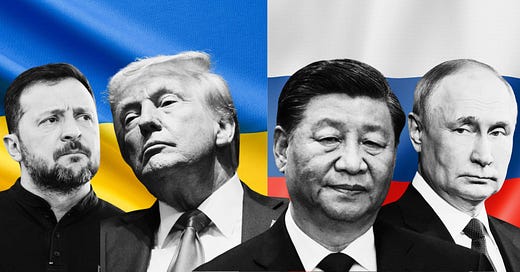Briefing: China's Role In Resolving War In Ukraine
Beijing's Offer to Mediate Peace Raises Questions About Neutrality and Global Influence
Overview
China has conveyed its readiness to take on a "constructive role" in finding a resolution to the war that continues in Ukraine. Beijing's diplomatic stance reveals its strategic efforts to support Russia while preserving its reputation as an impartial mediator on the world stage. A summary of major developments and perspectives surrounding China's involvement follows.
China's Diplomatic Engagements
Chinese Foreign Minister Wang Yi recently visited Moscow, holding talks with Russian Foreign Minister Sergei Lavrov and meeting President Vladimir Putin. Wang stated that China is ready to contribute to the settlement of the conflict while considering the aspirations of all involved parties.
During these discussions, Wang emphasized deepening Sino-Russian cooperation and highlighted China's commitment to peace and development for humanity.
China's Official Stance
Beijing presents itself as a neutral party in the conflict, claiming it does not provide lethal aid to either side. However, it has been labeled by NATO members as a "decisive enabler" of Russia due to its close political and economic ties with Moscow.
China has abstained from condemning Russia's actions in Ukraine but has supported certain peace-related UN resolutions, signaling a nuanced approach.
China's Peace Proposals
In 2023, China released a 12-point peace plan emphasizing principles like sovereignty, territorial integrity, and non-escalation while opposing unilateral sanctions. However, the plan lacked specific measures and was seen as symbolic rather than actionable.
Recently, China reiterated its support for peace talks and proposed hosting negotiations between key stakeholders, including Russia and the United States.
Strategic Considerations
Balancing Relations: While China emphasizes neutrality, its close alliance with Russia complicates its role as an impartial mediator. Beijing’s economic support for Moscow has helped mitigate the impact of Western sanctions.
Global Image: China's mediation efforts aim to bolster its reputation as a responsible global power, particularly among developing nations. However, skepticism persists about its true intentions and effectiveness in fostering peace.
Leverage Over Russia: As a major ally of Moscow, China holds unique leverage that could influence Russia’s stance on peace negotiations. This leverage may be critical in facilitating any future settlement.
Challenges Ahead
Perceptions of Bias: NATO countries and Ukraine remain wary of China's alignment with Russia, questioning Beijing's ability to act as an honest broker.
Lack of Concrete Proposals: Critics argue that China's initiatives lack actionable steps toward resolving the conflict, reducing their credibility as meaningful contributions to peace efforts.
Exclusion of Ukraine: Past Chinese proposals have often overlooked direct engagement with Ukraine, undermining their inclusivity and effectiveness.
Conclusion
As China seeks to demonstrate its expanding diplomatic influence by actively participating in the resolution of the Ukraine war, its close relationship with Russia also presents substantial challenges. Beijing's potential impact on peace initiatives exists alongside persistent doubts about its impartiality and absence of definitive plans which hinders wider acceptance of its mediating role in the conflict.
Source Material
U.S.-China Commission: China's Position on Russia's Invasion of Ukraine
Parley Policy Initiative: China's 12-point Peace Plan Explained
Brookings Institution: Should China Have a Role in Ending the War in Ukraine?
Stimson Center: Which Future for Ukraine?
South China Morning Post: China's Ukraine Peace Plan
PRC Leader: China's Strategic Straddle
The Moscow Times: China Is Ready to Play 'Constructive Role' in Ending Ukraine War, Foreign Minister Says




